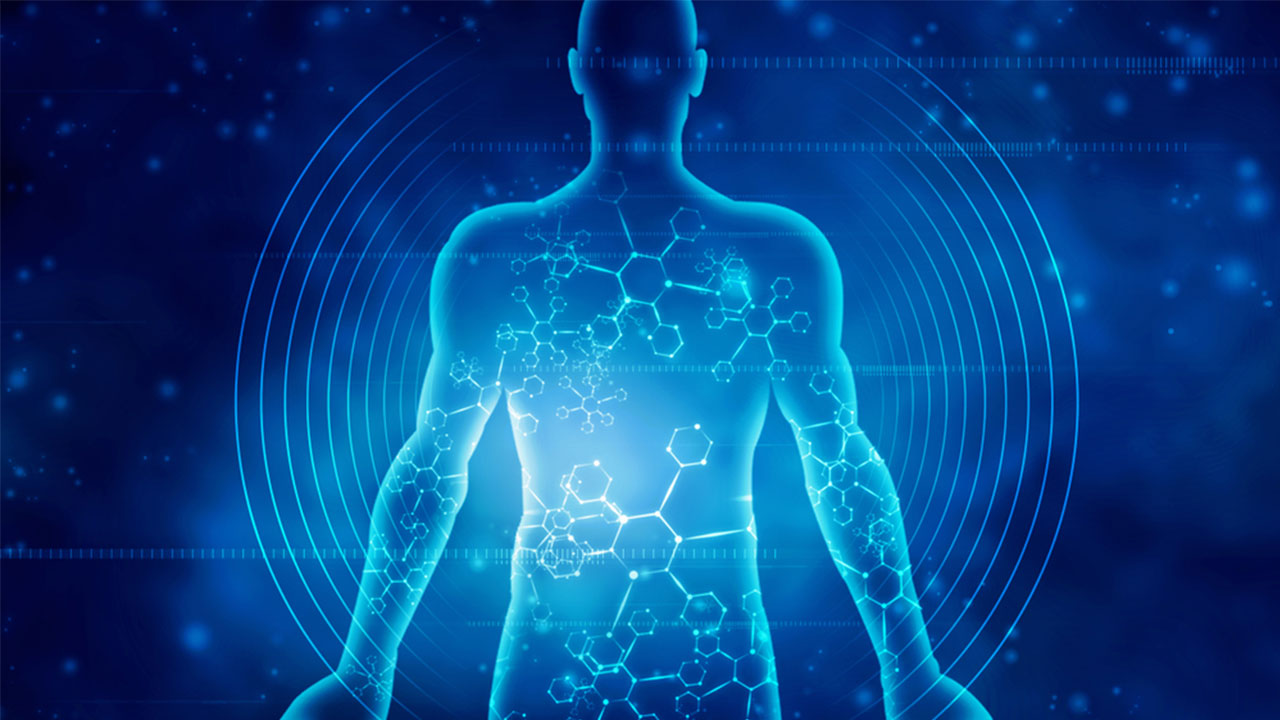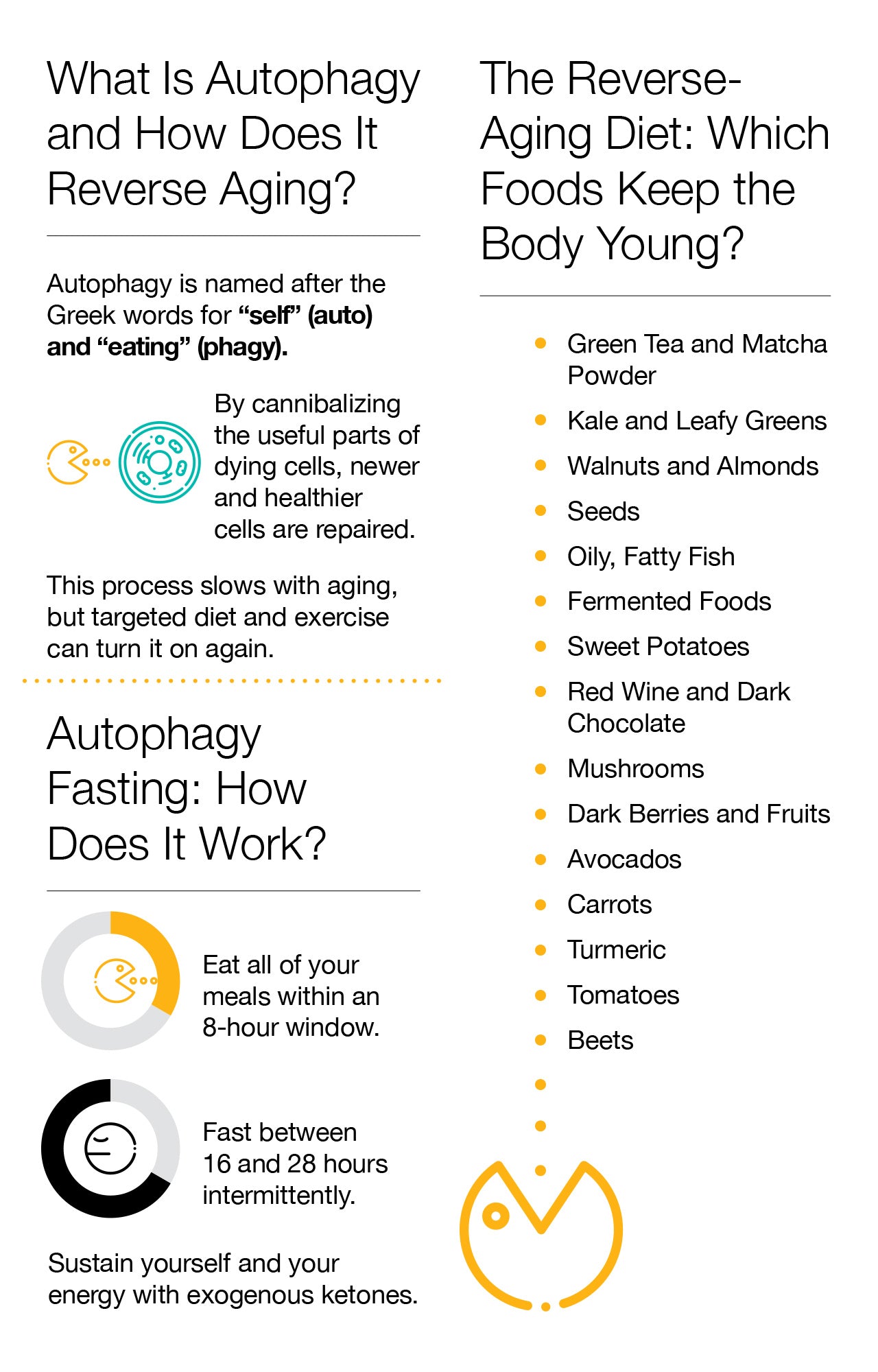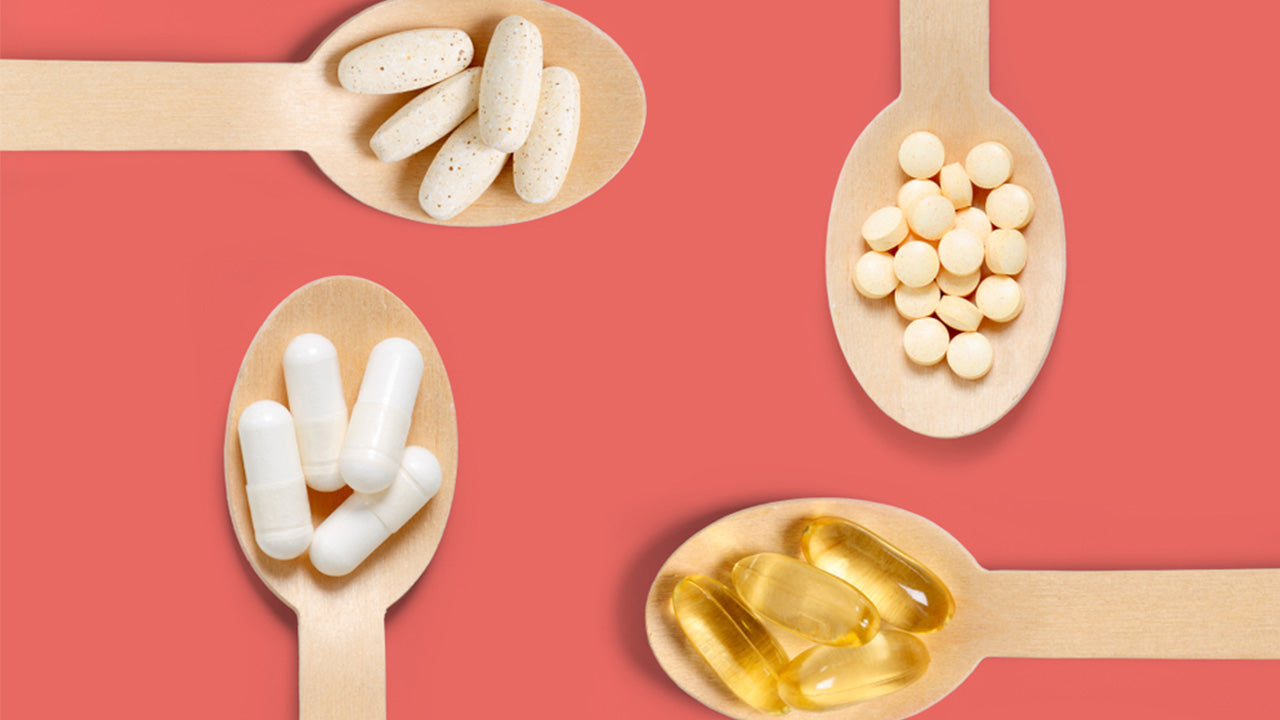The Reverse-Aging Diet: Is Autophagy the Key to Staying Young?
 By: by Amino Science
By: by Amino Science

The reverse-aging diet is also known as "eating for autophagy," but what does that mean for you? Autophagy is a biological process that allows the body to recycle aging or dying cells to synthesize new and better ones. It's not exactly like a keto or paleo diet where you can just know what not to eat and carry on—there's a timing aspect to autophagic eating, as well as specific foods that have their own anti-aging strengths. We'll cover both aspects of the reverse-aging diet here.
What Is Autophagy and How Does It Reverse Aging?
The body's autophagy process was discovered in the 1950s and '60s accidentally by Christian de Duve, a Belgian scientist who was studying insulin at the time. He named the process after the Greek words for "self" (auto) and "eating" (phagy), because in a sense that is what it entails: the body sends cells around to cannibalize the useful parts of dying cells, or to eat up the garbage byproduct of normal cell functioning, and uses those pieces to repair or replace dying cells with stronger cells. It's like a molecular version of recycling and up-cycling material that would otherwise be clogging up the streets.
Scientific understanding of autophagy didn't advance again until the 1970s and '80s, when another Nobel prize-winning scientist, Yoshinori Ohsumi, discovered the genes that regulate the autophagic response. It was ultimately determined that, just as with all the other processes in the body, autophagy starts to decline with age. Autophagy on decline is sort of like having a broken garbage disposal and leaving leftover food bits in your sink: eventually this will gum up the works.
And yet, just as it's possible to get your garbage and recycling habits back in working order, it's also possible to trigger autophagy even as you age and the process naturally slows. By using diet to manipulate a "stress response" in the body, you can essentially assign cleaning days to your cells, the same way you might when creating a chore chart for a busy family: some days are for cleaning and some days are for more thoroughly enjoying life in a clean house.
Long story short, by using intermittent fasting practices and eating key nutritional foods, you can regularly bring autophagy out of a sluggish maintenance mode and make sure the cellular garbage in your body doesn't overwhelm healthy functioning and lead to symptoms of aging.
Autophagy Fasting: How Does It Work?
Autophagy is actually part of some diets like keto and Atkins, diets that carefully put the body into a small nutritional crisis to manipulate healthy results. By inhibiting carbohydrate intake for example, the body becomes alarmed enough to start burning fat stores for energy. Usually the body guards these fat stores like piles of emergency gold in case of famine, but in a modern, First World context, famine is way less of a threat, while obesity contributes to more and more preventable deaths each year.
If you want to fast in a way that triggers autophagic metabolism and slows down the aging process, follow these basic steps:
- Eat all of your meals within an 8-hour window. You still need your essential nutrients, but you want your body to spend some energy cleaning up rather than digesting and functioning all the time. For the best foods to eat for autophagy, read on to the next section.
- Fast between 16 and 28 hours intermittently. Periods of nutrient deprivation trigger autophagy. The reason intermittent fasting works is that it triggers the sort of secondary metabolisms we evolved to survive in harsh climates, but it does so in small windows of time without actually starving us.
- Sustain yourself and your energy with exogenous ketones. While fasting, water, tea, and black coffee are acceptable to consume. If you choose to add MCT oil (medium-chain triglycerides from coconut oil) to your drink, your body will have just enough energy to function and feel satiated without interrupting your fasting goals for weight loss or cellular clean-up.
Autophagy is also triggered by vigorous exercise routines, like HIIT workouts (high-intensity interval training), which, much like intermittent fasting, utilize small windows of high stress to elicit the biological responses we need to stay young and healthy. Modern life is often too safe and sedentary, and our survival mechanisms get weak from lack of use. Autophagy reminds our bodies that each day is still a matter of life and death.

The Reverse-Aging Diet: Which Foods Keep the Body Young?
You'll want to start by reducing (not eliminating) carbs. Eating more low carb starts inching your body towards ketosis, with the beneficial side effect of losing body fat and weight. In addition to lowering carb intake, you'll want to consume nutrient-dense foods with compounds that contribute directly to the body's anti-aging efforts.
Green Tea and Matcha Powder
Green tea has become nearly synonymous with longevity, so much so that statistically the more green tea you consume regularly, the longer you live. This is why it's a staple in almost every anti-aging diet. Green tea and matcha powder (ground green tea leaves) contain polyphenols that help reduce the inflammation caused by free radical toxins. And catechins in green tea can help prevent the effects on sun damage and the appearance of fine lines when used topically in skincare products.
Kale and Leafy Greens
Cruciferous vegetables and leafy greens are rightly considered superfoods. Kale, broccoli and broccoli greens, spinach, Brussels sprouts—all of these lean greens contain hefty amounts of vitamin K, lutein, fiber, and phytochemicals that help reduce the risk of cancer and guard against the oxidative damage of free radicals. Their vitamin A content contributes to healthy, youthful skin and wound repair, while their vitamin C content serves as a precursor to collagen and new skin cell production. Plus, vitamin C acts as an antioxidant so powerful it helps prevent cold and flu infections. The vitamins and minerals in leafy greens are some of the best anti-aging nutrients to be found.
Walnuts and Almonds
Most nuts contain valuable amounts of omega-3 fatty acids and plant-based protein, but that isn't the end of their value as anti-aging food. Walnuts in particular may extend life for up to 3 years, possibly by reducing the risk factors for cancer and heart disease. And almonds are full of vitamins A, B, and E, healthy fats, and antioxidants that belong in every healthy diet to help reduce inflammation from the skin to within.
Seeds
Just about any seed that isn't poisonous is good for you, from chia to sunflower to flaxseeds. Ask any dietitian or nutritionist if you're eating enough seeds, and the answer will likely be a resounding "no!" Most of us in the modern world don't consume seeds nearly as much as we're evolved to. In fact, we have intentionally engineered seedless foods like watermelon and bananas just to avoid what we should be consuming regularly.
Chia seeds are sources of water-soluble fiber that swells with liquid and helps slow down digestion and keep blood sugar levels from spiking. They are anti-inflammatory, full of omega-3s, and contain all nine essential amino acids necessary for new muscle growth at all stages of life.
These features can be found in flaxseeds as well, which have anti-aging nutrients for your skin and flavonoids known to help lower LDL ("bad") cholesterol levels, improving the ratio between "good" HDL levels and lowering the risk of cardiovascular disease. If you enjoy a good trail mix with sunflower seeds, you're also fortifying your body with vitamin E, an antioxidant that can help protect against the sun's UV rays.
Oily, Fatty Fish
Eating the proper ratio of omega-3 to omega-6 fatty acids is necessary for optimal health. While both fatty acids are essential, the standard Western diet overemphasizes omega-6 fatty foods (they're in vegetable oils, which infiltrate our foods as additives), and downplays omega-3s, which are found in abundance in oily fish like salmon, sardines, and mackerel.
Omega-3 fatty acids help lower inflammation, and subsequently rates of dementia, heart disease, and arthritis. Salmon is abundant in astaxanthin, a powerful antioxidant that defends against aging. And heart-healthy sardines can help reduce the risk of developing diabetes. Sardines have the added advantage of being on the bottom of the food chain, meaning they are less likely to contain toxins they themselves have consumed (as may be the case with larger fish, which have higher mercury levels).
Access to fresh fish is not always easy to come by or affordable for those who live far inland. Luckily a fish oil supplement is easy to find and can help improve your joint health as well.
Fermented Foods
Fermented veggies like kimchi and sauerkraut along with fermented dairy products like kefir and Greek yogurt carry healthy probiotic bacteria. While prebiotic foods contain fiber for your existing good gut bacteria to digest, probiotic foods introduce new live cultures of beneficial gut bacteria to support healthy digestion, detox efforts, and immune system functioning.
Sweet Potatoes
Don't just pull out sweet potatoes for your fall menu. These spuds are some of the healthiest carbs around. As we pointed out at the top of this list, while it's good to lower your intake of carbs (and the fast sugars that come with them), it's not recommended to eliminate carbs entirely. Carbohydrates in fruits, starchy veggies, and foods like sweet potatoes can provide many beneficial nutrients. Particularly the skin of sweet potatoes contains concentrations of the anti-cancer compound anthocyanin, another valuable asset to staying young and healthy.
Red Wine and Dark Chocolate
Treats like red wine and dark chocolate contain useful nutrients too, specifically resveratrol, an anti-aging antioxidant. Consumed in moderation, the nutrients in the grapes that make red wine and the cacao nibs that make up the majority of dark chocolate provide protection against the age-accelerating damage of free radicals.
Mushrooms
It's strange but true: while mushrooms are grown in dampness and dark, if you place them in sunlight after harvesting, they soak up vitamin D from the sun just like human skin does. In fact, they soak up so much that 3.5 ounces of mushrooms can provide you 130-450 IUs of vitamin D you need, so you don't have to spend so much time in the sun or suffer the signs of aging that can come from sun damage.
Dark Berries and Fruits
Raspberries, blueberries, and pomegranates have deep coloring in common, as well as certain antioxidant concentrations that can greatly benefit your health. Pomegranates have enjoyed a recent hey-day as a superfood, but dark berries like blue and blackberries bring the same level of nutrition to every smoothie, yogurt, or dessert that includes them. These fruits' concentrations of vitamin A, vitamin C, and the antioxidant anthocyanin all work to help prevent chronic conditions from gaining a foothold. They also help increase collagen production for more supple, youthful skin.
Avocados
Avocados are one of the most well-known and versatile healthy fats in a low-carb dieter's kitchen. Delicious and creamy, they can be eaten as a veggie dip, utilized as a healthy spread, and turned into smoothies and dairy-free ice creams, all while providing you with vitamin A that protects your skin cells and omega-3 fatty acids that help your heart.
Carrots
Famous for improving eye health thanks to their beta-carotene content, carrots do even more to help preserve your youth and vitality. One study found a correlation between carotenoid consumption and romantic appeal and attraction. And if it's health effects you're after, the vitamin A in carrots protects your skin from viruses, bacteria, and the potential ravages of aging.
Turmeric
Speaking of brilliantly orange foods, turmeric and its active compound curcumin are famous natural remedies for inflammation, helping to ameliorate significant inflammatory conditions such as rheumatoid arthritis. Time and time again, in study after study, turmeric exhibits proven pain-relieving attributes and anti-inflammatory capabilities. So if you're looking to reverse aging with diet, you definitely want to pepper turmeric into your food routine. Add a dash of black pepper to increase bioavailability!
Tomatoes
The tomato is a fruit used in culinary capacities as a vegetable, but no matter how you slice it, the lycopene content inside tomatoes provides valuable disease resistance, specifically against osteoporosis, which affects 1 in 3 women and 1 in 5 men over the age of 50. Along with the health benefits of lycopene, tomatoes provide B vitamins like niacin and folate, vitamin C, and vitamin K. Here's a pro-tip for eating: add a little olive oil to help increase the nutrient absorption in your body.
Beets
Last but not least, maybe it's appropriate that beets have the approximate shape of a heart, because the nitrates they contain help improve arterial health and blood pressure, as well as help reduce inflammation like so many other anti-aging foods on this list. The nitric oxide content also helps protect your kidneys, and the rich color of beets makes for a beautiful presentation whether in a smoothie or on your plate.
Aging Can Be Reversed
While you can't turn back time, you can reverse the symptoms of aging that come from the slow-down of processes like autophagy. With the right supplies in your diet and an active lifestyle, you can easily be in better shape at 60 than you were at 30, when, in the brazenness of youth, many people don't take proper care of themselves. Damage done by poor diets or unhealthy lifestyles can be reversed, and the more you know about how to best strengthen your body, the better prepared you are to improve with age. Along with activating autophagy, supplementing with essential amino acids can help you do just that.

Up to 25% off Amino
Shop NowTAGS: diet plans
Join the Community
Comments (0)
Most Craveable Recipes




 833-264-6620
833-264-6620



















